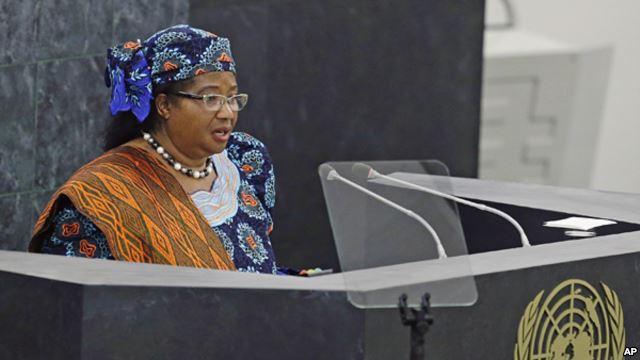For a country heavily reliant on foreign aid since independence, the recent Cashgate scandal has come at a substantial cost, as an estimated $150 million in aid committed to Malawi is now not being disbursed. Following Malawi’s multiparty reforms in 1994, donors have shown greater willingness to withdraw aid if certain conditions for economic and democratic governance are not met. The decision of numerous donors to delay assistance to Malawi in response to the Cashgate scandal is case in point. Beyond the sensational headlines, closer analysis of the scandal reveals political challenges that Malawi faces in its management of public finances, complicated by the effects of foreign aid provision and withdrawal.

Source: Voice of America. Malawi President Joyce Hilda Mtila Banda speaks to the United Nations General Assembly.
Cashgate refers to a corruption scandal in Malawi where government funds have been siphoned through fraudulent payments and loopholes via the country’s Integrated Financial Management Information System (IFMIS) platform. Malawians dubbed the scandal “Cashgate” because the first arrests made were of low-level bureaucrats found with stockpiles of cash in their homes and vehicles. To date, 81 people have been arrestedand 35 bank accounts have been frozen. Estimates of funds siphoned during Cashgate range from $20 million to $100 million.
The financial system through which the funds were stolen, IFMIS, has been heralded as an anti-corruption solution. Though there has not yet been a systematic assessment of IFMIS’s impact on corruption, it was expected to have a deterrence effect by increasing risks of detection. But the problem with government spending and budgeting in Malawi is not merely technical – it is also political.
In 2004, political scientist Lise Rakner and colleagues identified four political obstacles to public finance management in Malawi:
- Incentives facing the key stakeholders from civil service, the executive branch, politicians, as well as private sector undermine formal processes and institutions at each stage of the budget process.
- Accountability institutions are vulnerable to subversion, under funding and political patronage.
- There is insufficient demand for economic accountability from local civil society.
- Finally, donor conditionality linked to economic accountability produces unintended consequences.
These four political obstacles are still problematic in Malawi today, with one important exception – there has been increasing pressure from civil society in recent years on issues related to economic governance. Likewise, civil society has pressured the government to not delay in publishing the forensic audit report for Cashgate and there have been calls from civil society for the president to publicly declare her assets.
IFMIS, a technical solution to deter corruption in public finance management used in Malawi since 2006, was insufficient on its own in exposing and stopping corruption. Technical solutions alone will fall short in facing corruption when not also addressing the incentives of those in power. This donor-supported technical solution, complemented with an active and vocal civil society, following a change in political leadership, is what uncovered the Cashgate scandal. Government and donor decisions in the wake of the scandal will have real implications for ordinary Malawians, whose country is largely dependent on foreign aid, and will also have consequences for the upcoming election in May 2014.
Stay tuned for my second post in this series on Thursday when I look at issues of donor dependence and donor withdrawal and the political and economic implications of the Cashgate scandal.
